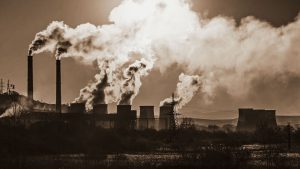Some experts have advocated for urgent efforts in cutting down methane emissions in Nigeria.

The experts made the call at a capacity-building workshop and stakeholders engagement on methane emissions reduction in Nigeria.
The workshop was organised by the Centre of Journalism Innovation and Development (CJID) and the Natural Resource Governance Institute (NGRI).
Speaking at the workshop, TJ Conway, an Energy and Climate Expert, said that methane contributed to about 30 per cent of global warming.
Methane is a greenhouse gas whose presence in the atmosphere affects the Earth’s temperature and climate system.
“Methane is more than 80 times more potent than carbon dioxide (CO2) over a 20-year period.
“The global oil and gas industry emits more than six billion tons of CO2 equivalent to methane over a 20-year period.
“This is about 25 per cent of human-made emissions,” Conway said.
According to him, there is an urgent need for concerted efforts involving government, communities, media, and the oil and gas industry to address the situation.
He said that it was crucial for the media and civil society organisations (CSOs) to understand the impact of methane on climate change to advocate for appropriate actions.
Speaking, the Editor of Pluboard, a media company, Mr. Ini Ekott, said that Nigeria was among the world’s top 10 methane emitters, mainly due to leakages and flaring.
He said that Nigeria flared an estimated 5.3 billion cubic meters of natural gas, equivalent to 177 million 12.5 kg gas cylinders.
According to Ekott, the media and CSOs should hold the government and oil companies accountable for such emissions, which are mostly not in compliance with best practices.
Dr. Charles Ofori, the Policy Lead at the African Centre for Energy Policy (ACEP), stated that reducing emissions from oil and gas was an effective way to mitigate methane.
Ofori explained that existing technologies could be deployed for mitigation, such as replacing pneumatic units in oil and gas systems, capturing and utilising methane, and detecting and repairing methane leaks.
“Limited political will is hindering effective implementation of methane management.
“Weak coordination among government agencies affects effective regulatory oversight.
“The required actions include governments taking responsibility for their emissions and implementing realistic plans to eliminate methane emissions.
“Government, companies and other stakeholders must design specific policies to deal with methane abatement,” Ofori said.
Similarly, Alexander Sewell, Advocacy Manager at Stakeholders Democracy Network, stated that methane emissions affected agricultural productivity and contributed to climate change.
He underscored the importance of appropriate data on gas emissions which could be used to hold organisations accountable.
By Martha Agas
